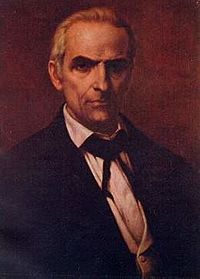Taken from the Facebook account of the National Archives of Cuba
José de la Luz y Caballero died in Havana 160 years ago, on June 22, 1862. The event shocked the citizenry, the colonial authorities who tactfully took care to revere him, and those who agreed to his pedagogical work or at least they heard about her. The details of that funeral are little known today. Here they go.
The Official Gazette of June 23 published the decree signed by Captain General José Serrano «to give solemn testimony of the consideration that the superior Government of this Island deserved for the literary merits and the public and private virtues that distinguished Mr. Don José de la Luz y Caballero ». A three-day school duel was arranged, with the doors of all the educational centers in the country closed. The funeral took place on the afternoon of June 23, and included eulogies from more than one prominent Creole. More than six thousand fellow citizens accompanied the remains to the cemetery and the coffin was carried on their shoulders. The verses written for the occasion by the poet José Fornaris, disseminated in the press, were considered "reckless" and caused the occasional official dismissal.
Of the Cubans of his time, José de la Luz was one of the most admired and followed. But note the year of death: 1862. The independence process has not started, there are six years left before the liberating flame is lit and Don José, despite his very active life within society, despite his sense of justice and The truth is, he was not – and frankly we do not believe he ever would have been – a trench man. He was a teacher, a civil figure, a philosopher, an illustrious intellectual. His thoughts turned to the education of his countrymen.
General Antonio Maceo , after reading his biography, pointed out "shrewd scruples", as the writer and critic Rafael Esténger points out , since "Maceo did not recognize José de la Luz as a man of great sentiments, since he inherited and sustained slavery who testified to his death.
Our comments are not intended to review the life of this illustrious Cuban, let us only emphasize that it was not easy for Luz y Caballero to "deal" with colonial authoritarianism from his position as a teacher. He founded the El Salvador school. He traveled through Europe and North America, got to know the literature of those peoples, rubbed shoulders with the great authors and taught —because this was the work of his entire life—. He mastered several languages: Latin, English, French, Italian, German and could read the Russian language. He also went through enormous troubles, such as the death of his only daughter, during a cholera epidemic.
Over the years, the example of Don José remained enlightened for a long time. With the irruption of the republic in 1902 he became one of the paradigms on which a new nation would supposedly be built. That it didn't happen wasn't his fault. And again over the years, even more years, the brightness dimmed and oblivion, or semi-oblivion, took over his name and what he did. The times of revolution demanded men of greater drive, perhaps more sanguine, and Don José did not correspond to such mold.
Even so, much can still be said about him, his aphorisms will never stop being talked about, and neither will his wisdom and dedication to instruction.
We decided to remember this anniversary with the words of José Martí that judge him masterfully and give us back the freshness of Don José that we admire so much. Let us give the word in extenso , to Martí:
[…] Well, he was a teacher and in a single generation he converted a people educated for slavery into a people of heroes, of workers and free men. He could be a lawyer, with a respectful and wealthy clientele, and his country was his only client. He was able to effortlessly show off his copious science in the academies, and he only showed what he knew of the truth, when it was essential to defend it. He was able to write in works -for his country at least- immortal, what, helping the sovereignty of his understanding with the piety of his heart, he learned in books and in nature, about the music of creation and the meaning of the world, and he did not write in books, which reward, but in souls, which tend to forget. He knew everything that was known in his time; but not to teach that he knew it, but to transmit it. He sowed men.


Deje un comentario